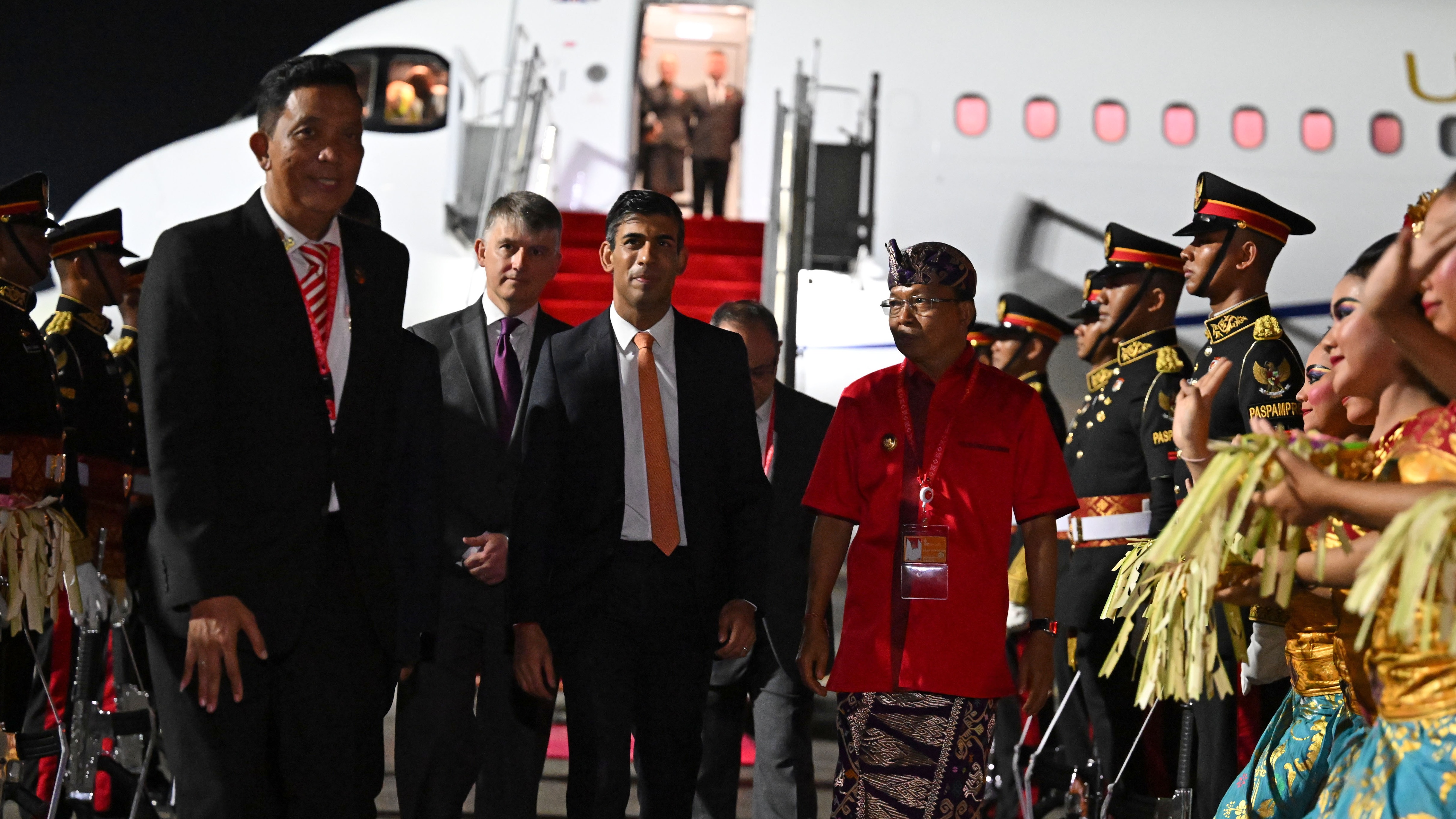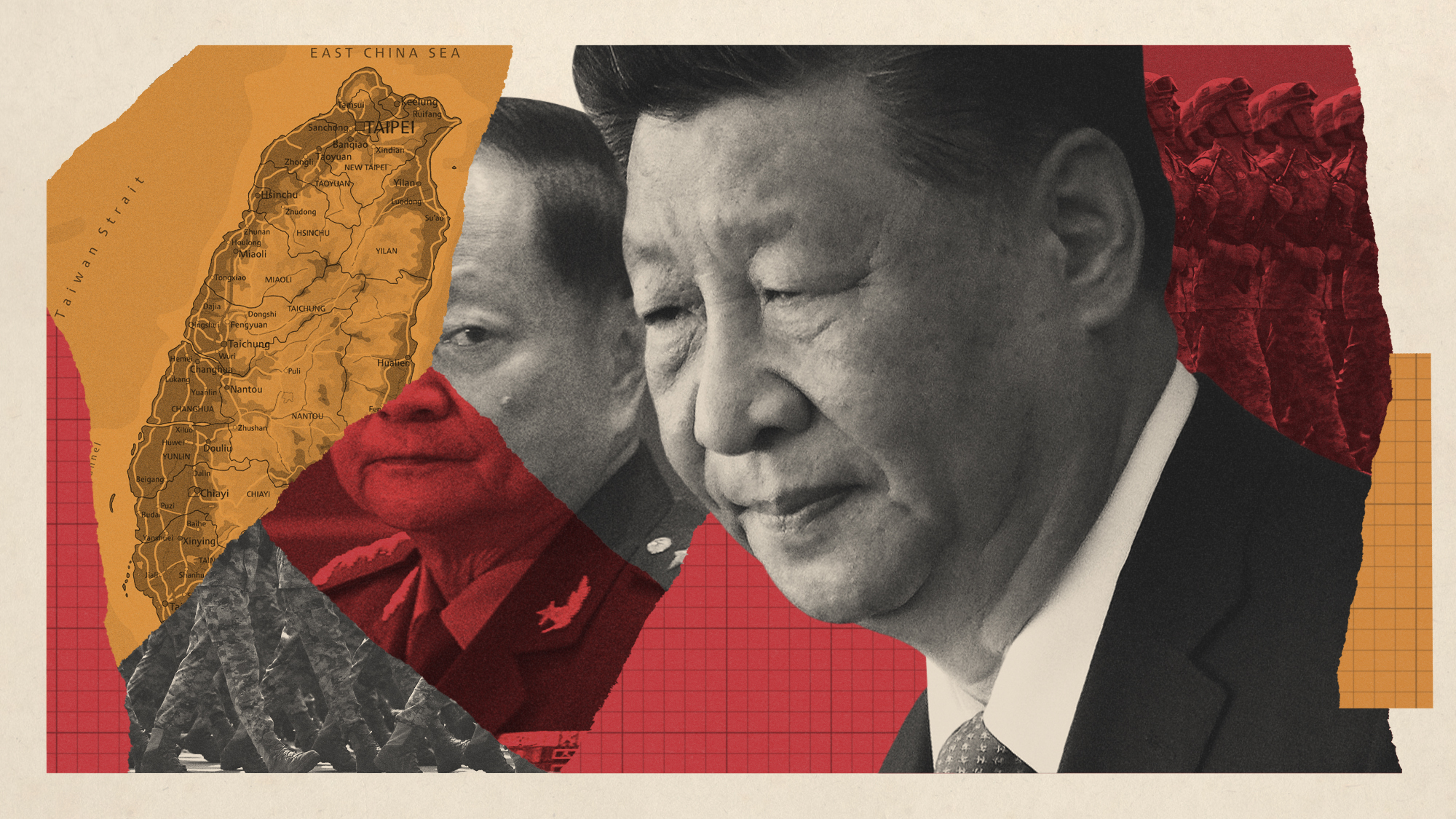G20 summit: five high-stakes issues facing world leaders
Pandemic recovery, global recession, US-China relations and war in Ukraine on Indonesian agenda

A free daily email with the biggest news stories of the day – and the best features from TheWeek.com
You are now subscribed
Your newsletter sign-up was successful
Rishi Sunak faces a major diplomatic test over the next 48 hours as he attends his first G20 summit as prime minister.
Following the Cop27 climate talks in Egypt last week, it is the second gathering of international leaders attended by Sunak in the three weeks since he became PM. And it will be a major opportunity for the former chancellor to “make his mark on the international stage”, said Politico.
The gathering of G20 leaders in Indonesia is set to be “the most highly anticipated meeting in recent history”, added the website, as the ongoing Russian invasion of Ukraine sends geopolitical shockwaves across the globe, leaving many major economies facing soaring food and energy prices. And with central banks raising interest rates to “tame runaway prices”, fears are growing that the world “may soon lurch from a cost-of-living crisis to a global recession”, said Al Jazeera.
The Week
Escape your echo chamber. Get the facts behind the news, plus analysis from multiple perspectives.

Sign up for The Week's Free Newsletters
From our morning news briefing to a weekly Good News Newsletter, get the best of The Week delivered directly to your inbox.
From our morning news briefing to a weekly Good News Newsletter, get the best of The Week delivered directly to your inbox.
So what’s on the agenda in Bali?
Pandemic recovery
Strengthening global health infrastructure, ensuring an inclusive digital economy transformation, and promoting a sustainable energy transition are all on Indonesia’s list of explicit priorities for the summit, as set out in an agenda released by the host nation in October.
The host nation had hoped for the summit to focus on the post-pandemic recovery, with the longer-lasting impacts of coronavirus on global growth set to be a “key topic”, according to CNBC. The summit’s tagline is an “optimistic” one, said Al Jazeera, as it asks G20 nations to “recover together, recover stronger”. But “prospects for cooperation appear to be slim” as the US and other Western nations “find themselves increasingly at odds with China and Russia” on the global stage.
Indeed as the host nation, Indonesia has “sought to maintain the forum’s neutrality” against increasingly stormy geopolitical waters, “rejecting calls by Western countries and Ukraine to exclude Russia” from the summit, noted Al Jazeera.
A free daily email with the biggest news stories of the day – and the best features from TheWeek.com
As the Russian invasion of Ukraine continues to cast a long shadow, British officials believe it will be “nearly impossible” for world leaders to agree on a communique at the end of the summit, leading to fears the event could be “written off as a diplomatic failure”, said The Guardian.
Global recession
The summit comes at a time when the world is tottering towards a global recession. Central banks across the world have been raising interest rates to try to tackle rampant inflation, “but prices struggle to return to pre-pandemic levels”, said Time.
Reports from the World Bank suggest the interest hikes, “coupled with financial market stress”, may lead to “global GDP growth slowing down to 0.5% next year”. This would “destabilize major economies and significantly slow poverty alleviation in developing countries”, added the magazine.
The world’s economic woes have been further exacerbated by international supply chain issues caused by Covid-19, “especially in China”, as well as “twin food and energy security crises stemming from regional conflicts, including the war in Ukraine, and natural disasters intensified by climate change”, said Time.
Russian invasion of Ukraine
Russia’s war in Ukraine is unavoidably the issue set to dominate the entire summit. Sunak’s attendance “will mean the first encounter between a U.K. prime minister and a Russian government figure”, said Politico, as Sunak is set to come face to face with Russia’s foreign minister Sergey Lavrov, who is attending on behalf of President Vladimir Putin.
Sunak has already signalled he is to take a tough stance on Russia. In an article in The Telegraph written before his arrival in Bali, he called Russia a “rogue state” and criticised Putin for his failure to attend. “The man who is responsible for so much bloodshed in Ukraine and economic strife around the world will not be there to face his peers,” Sunak wrote.
Russia will be “under increasing pressure” to extend the United Nations Black Sea Grain Initiative, an agreement reached earlier this year to ease Russia’s naval blockade of key Ukrainian ports in order to prevent a humanitarian crisis, said the i news site. Russia has flip-flopped over the deal in recent months, and the current accord is set to end this week, leading to fears that it “could lead to starvation in some parts of the world”.
“To agree would not cost Russia anything,” said Laura von Daniels, from the German Institute for International and Security Affairs, in a Council on Foreign Relations report. “It would, though, allow both Xi and Putin – as leaders of authoritarian states – to be applauded on the world stage for providing food security.”
US-China relationship
The Guardian identifies bilateral talks between US President Joe Biden and Chinese counterpart Xi Jinping as a “key meeting” to watch, despite not “strictly” being part of the G20 summit.
Biden has said that the talks are aimed at “resetting” Washington’s relationship with China, while a spokesperson from the Chinese foreign ministry has said Beijing hopes that US-China relations can be brought “back on track”.
“But expectations for the meeting are low,” said CNN. “Locked in an intensifying great power rivalry, the US and China disagree with each other on just about every major issue, from Taiwan, the war in Ukraine, North Korea, the transfer of technology to the shape of the world order”.
And while Biden may be buoyed by better-than-expected results in the US midterms, Xi is unlikely to be in the mood to make any major diplomatic concessions, having “consolidated” his power at last month’s Communist Party Congress to become “the strongest Chinese leader since Mao Zedong”.
Anglo-French relations
It may still be “early days in the courting process” but senior French and British officials are “daring to hope that a new Entente Cordiale may be forged between Rishi Sunak and Emmanuel Macron in the weeks and months ahead”, said Politico.
After a successful bilateral meeting at the Cop27 summit in Egypt last week, it is hoped relations between Sunak and the French president will blossom further this week when they meet again at the G20 summit.
And there are already positive signs of a burgeoning new era from Anglo-French relations. This morning saw the two countries agree that the UK “will pay France £8m more a year under a revised deal to try to stop people crossing the English Channel in small boats”, said the BBC.
Sorcha Bradley is a writer at The Week and a regular on “The Week Unwrapped” podcast. She worked at The Week magazine for a year and a half before taking up her current role with the digital team, where she mostly covers UK current affairs and politics. Before joining The Week, Sorcha worked at slow-news start-up Tortoise Media. She has also written for Sky News, The Sunday Times, the London Evening Standard and Grazia magazine, among other publications. She has a master’s in newspaper journalism from City, University of London, where she specialised in political journalism.
-
 The Gallivant: style and charm steps from Camber Sands
The Gallivant: style and charm steps from Camber SandsThe Week Recommends Nestled behind the dunes, this luxury hotel is a great place to hunker down and get cosy
-
 The President’s Cake: ‘sweet tragedy’ about a little girl on a baking mission in Iraq
The President’s Cake: ‘sweet tragedy’ about a little girl on a baking mission in IraqThe Week Recommends Charming debut from Hasan Hadi is filled with ‘vivid characters’
-
 Kia EV4: a ‘terrifically comfy’ electric car
Kia EV4: a ‘terrifically comfy’ electric carThe Week Recommends The family-friendly vehicle has ‘plush seats’ and generous space
-
 Should the EU and UK join Trump’s board of peace?
Should the EU and UK join Trump’s board of peace?Today's Big Question After rushing to praise the initiative European leaders are now alarmed
-
 Local elections 2026: where are they and who is expected to win?
Local elections 2026: where are they and who is expected to win?The Explainer Labour is braced for heavy losses and U-turn on postponing some council elections hasn’t helped the party’s prospects
-
 Witkoff and Kushner tackle Ukraine, Iran in Geneva
Witkoff and Kushner tackle Ukraine, Iran in GenevaSpeed Read Steve Witkoff and Jared Kushner held negotiations aimed at securing a nuclear deal with Iran and an end to Russia’s war in Ukraine
-
 ‘The forces he united still shape the Democratic Party’
‘The forces he united still shape the Democratic Party’Instant Opinion Opinion, comment and editorials of the day
-
 How corrupt is the UK?
How corrupt is the UK?The Explainer Decline in standards ‘risks becoming a defining feature of our political culture’ as Britain falls to lowest ever score on global index
-
 ‘The mark’s significance is psychological, if that’
‘The mark’s significance is psychological, if that’Instant Opinion Opinion, comment and editorials of the day
-
 What do Xi’s military purges mean for Taiwan?
What do Xi’s military purges mean for Taiwan?Today’s Big Question Analysts say China’s leader is still focused on reunification
-
 The ‘mad king’: has Trump finally lost it?
The ‘mad king’: has Trump finally lost it?Talking Point Rambling speeches, wind turbine obsession, and an ‘unhinged’ letter to Norway’s prime minister have caused concern whether the rest of his term is ‘sustainable’